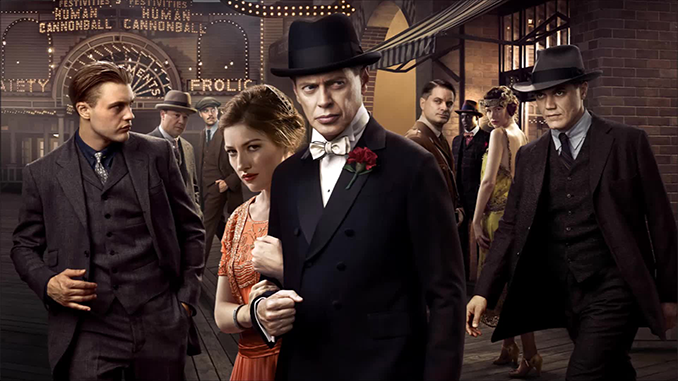TV Rewind: The Distinctly Gorgeous Faces of Boardwalk Empire
Photos Courtesy of HBO
Editor’s Note: Welcome to our TV Rewind column! The Paste writers are diving into the streaming catalogue to discuss some of our favorite classic series as well as great shows we’re watching for the first time. Come relive your TV past with us, or discover what should be your next binge watch below:

I first dove into HBO’s Boardwalk Empire around the time it was airing during the 2010s, and recently dove back in for a revisit a few months ago. In college, when I was at the peak of my obsession with the series, I could not stop talking about, thinking about, tweeting about, and most importantly blogging on Tumblr about Boardwalk Empire. I was completely taken by the period drama, a revolving door of familiar lead and supporting actors, woven into a multilayered journey throughout 1920s Atlantic City. There, gangsters and politicians (often one and the same) rub shoulders and make plays for power, as illegal alcohol and drugs are carted through and the feds stay close on their tail. What struck me the most in my second watch was less the story and characters, which are rich and routinely gripping, but the sheer beauty and eclecticism of the expansive, character actor-centric cast—something that undoubtedly played into my zealotry when I first became fanatical about a Prohibition-era crime drama as a teenager.
Prolific character actor Steve Buscemi plays what could be defined (at least, for a little while) as the series lead, Nucky Thompson. Thompson is loosely based on the real-life Enoch L. Johnson, a corrupt political figure and crime boss in Atlantic City, New Jersey during the early 20th century. Throughout the series, we follow the various people in Nucky’s personal and professional orbit, which often includes actors playing fictional interpretations of real-life historical figures, like Stephen Graham as Al Capone, or Michael Zegen as Benjamin Siegel. There’s Nucky’s war-torn protégé, Jimmy Darmody (Michael Pitt), Jimmy’s wife Angela (Aleksa Palladino), and his very young mother, Gillian (Gretchen Mol). Nucky’s brother and Atlantic City sheriff, Eli (Shea Whigham), and the New York gangsters doing business with Nucky, Arnold Rothstein (Michael Stuhlbarg), Lucky Luciano (Vincent Piazza), and Meyer Lansky (Anatol Yusef). The Black Atlantic City gangsters Nucky regularly works with, led by Chalky White (Michael K. Williams), and the Prohibition Agent investigating Nucky, Nelson Van Alden (Michael Shannon). Naturally, these are only a handful of the people and narratives interlaced across the series’ five seasons arc.
Despite an illustrious career largely defined by unforgettable supporting parts as villains and various lowlifes, with his trademark large, reptilian eyes and nasally voice, Steve Buscemi has very rarely been allowed a place in the spotlight. Such is the life of the character actor; historically the actors with more unusual faces are kept largely at the sidelines playing eccentric backup parts—though that’s not necessarily a bad thing. These actors don’t sell the film to the public at large, but they enhance it and are frequently better than the lead. If the lead is the heart of a movie or television project, then the character actors are the veins supplying precious blood to it.
Enter Terence Winter, who had recently come from writing and executive producing Seasons 2-6 of The Sopranos, and was hired in 2008 to adapt the non-fiction book entitled “Boardwalk Empire: The Birth, High Times, and Corruption of Atlantic City.” Winter had worked with Buscemi on Season 5 of The Sopranos, and Boardwalk executive producer Martin Scorsese had also expressed desire to work with the celebrated actor. The series, thus, placed Buscemi in yet another role as a degenerate scum, not unlike the scum which Buscemi’s distinct look has easily typecast him as before. This time, Buscemi was given the opportunity to be both the villain and the lead protagonist, and a towering, menacing one at that. It was the kind of role which acted in stark opposition to the submissive lackeys and conniving henchman that have otherwise marked his filmography for the past nearly four decades.
-

-

-

-

-

-

-

-

-

-

-

-

-

-

-

-

-

-

-

-

-

-

-

-

-

-

-

-

-

-

-

-

-

-

-

-

-

-

-

-








































